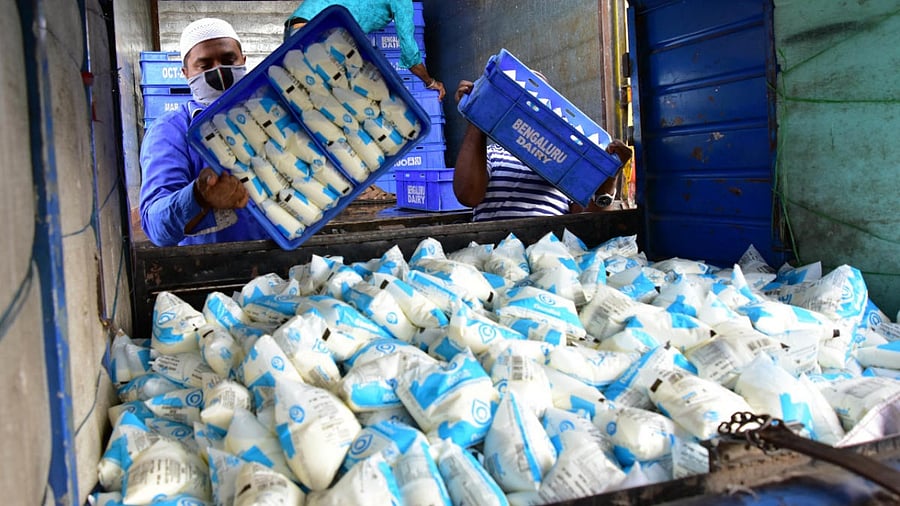
Only a few statements are memorised and repeated without being understood, such as “mitochondria is the powerhouse of the cell” or “the Earth revolves around the Sun". If one were to mention the term ‘Cooperatives’ to an academic, a pre-recorded message will be played: Cooperative movement is a failure in India. However, the government favours cooperatives, while the academia disapproves of it, making the dichotomy apparent. Adding to the confusion, the Union government has minted a new ministry, sparking a nationwide dialogue.
While debates rage over the federal structure and effectiveness of cooperatives, there is hardly any squeak on producer cooperatives, not even on the venerable Amul. All the debates are on: How strong is the effect of credit cooperatives on financial services, their seemingly astronomical tunes of credit disbursal (more than one-third of total Union Budgetary receipts), the importance of institutional credit and so on. On the other hand, discussions are hot on what constitutes a Centre-state relationship and who infringed upon whose rights. A recent Supreme Court verdict striking down an amendment on the issue could not have come at a better time. Yet, politics will always find ways to nestle itself wherever there are people and most importantly, where money is. It is no secret that control of credit translates to control of power.
Credit is not everything; a farmer might receive timely and institutional credit but still hang himself, unable to repay loans due to a crash in prices or loss of the produce. Both the government and academia need to understand that subsistence farming is not a business activity; it is the last resort of a helpless peasant. Rejoicing over profits accumulated in banks accrued through interest from farmers is myopic. Enrichment through usury is not a long term solution. Therefore, it is indeed appalling to see the producer/marketing cooperatives being kicked to the curb, despite being the most significant contributors to the farmer and rural incomes, wherever they are active.
A producer cooperative society is a cooperative organisation where producers, generally farmers or artisans, come together to prevent exploitation from both pre-harvest and post-harvest swindling and losses. Since there isn’t any employer-employee relationship in the cooperative, principal-agent problems and the problems of moral hazard do not arise. This empowers the farmers to utilise economies of scale and even contribute significantly to knowledge sharing and social cohesion.
Producer/marketing cooperatives such as Amul, Karnataka Milk Federation, Co-optex of Kancheepuram saree fame, IFFCO and many others have directly transformed the lives of many Indians, especially the poor. The minister for cooperation said that the government is determined to empower cooperatives and had already directed IFFCO and KRIBHCO (both fertiliser cooperatives) to work in seed production. However, what the producer cooperatives need is support and not directives, they’ve got enough of the latter. Empowerment needs to be tangible and real— devoid of lip service.
A new ministry implies a new budgetary allocation and the cooperative sector needs massive investments in organising new cooperatives and building capacities in the existing ones. Going by the figures of the Union Budget, the Budget deficit itself is 20.87 lakh crore (Receipts: Rs 14.24 lakh crore, expenditure: Rs 35.11 lakh crore); suffice to say for every rupee we earn, we spend Rs 2.5. It needs to be seen how much of the monetary empowerment a cash-strapped government is willing to provide to a fledgling but ambitious ministry in a pandemic year.
The credit cooperatives are monitored and in turn supported by NABARD, RBI, the Union and the state governments through actions such as loan waivers that naturally solve the defaulters and NPA problems. In Karnataka alone, loan waivers have been implemented about four times in the last 15 years. No such support has been shown towards the producer/marketing cooperatives that have been gasping for want of material and legal aid.
In Karnataka, ‘Transport Cooperative Society, Koppa’ was a renowned organisation, whose fame was reported in India and abroad. It successfully served the needs of service-deprived people of the Western Ghats of Karnataka. It now begs for help and assistance as it lost its mortgaged assets, including buses, owing to the pandemic. When such an illustrious organisation met such an unceremonious end, it is difficult to believe that a newly minted ministry sitting thousands of miles away will aid crucial cooperatives in similar waters.
Academicians’ contempt
Researchers and academics have been gradually tilting towards the economic right for quite a few decades now. Possibly, this bias prevents them from actually verifying and valuing a truly social mode of production and consumption. Granted that government has no business in business, but cooperatives are a political creature— they have the elements of both unionisation and election. Most importantly, cooperatives aren’t expected to work as an everyday company— they are an equitable vehicle of development, not merely an instrument for shareholder wealth maximisation. As long as this dichotomy isn’t appreciated in academic circles, our politicians will steal the thunder.
With the current information at hand and the track record, it does not seem that producer cooperatives will receive their deliverance this time either. Like flies attracted to manure, politics is attracted to money. In this case, it was attracted to the politically and financially rich credit cooperatives but neglected the much-needed producer cooperatives. Does the government favour cooperatives? Yes, with regard to credit but not with regard to producers, thus, creating a classic case of putting the cart before the horse, again.
(The writer is part of the PES University faculty)